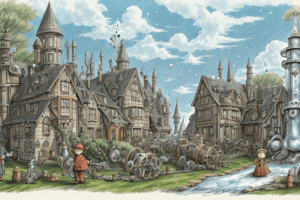Podcast
Questions and Answers
What is the product of force and displacement?
What is the product of force and displacement?
- Energy
- Acceleration
- Power
- Work (correct)
What is the unit of power?
What is the unit of power?
- Newton (N)
- Watt (W) (correct)
- Meter per second (m/s)
- Joule (J)
What is the force that causes rotation?
What is the force that causes rotation?
- Friction
- Torque (correct)
- Normal force
- Tension force
What is the type of friction that occurs when an object is stationary?
What is the type of friction that occurs when an object is stationary?
What is the concept of relative motion?
What is the concept of relative motion?
What is the equation of motion that relates velocity, initial velocity, and acceleration?
What is the equation of motion that relates velocity, initial velocity, and acceleration?
What is the type of energy that an object possesses due to its motion?
What is the type of energy that an object possesses due to its motion?
What is the law of motion that states that every action has an equal and opposite reaction?
What is the law of motion that states that every action has an equal and opposite reaction?
What is the type of force that arises from the interaction between two surfaces in contact?
What is the type of force that arises from the interaction between two surfaces in contact?
What is the moment of inertia of an object?
What is the moment of inertia of an object?
Study Notes
Kinematics
- Motion in a Straight Line:
- Distance and displacement
- Speed and velocity
- Acceleration
- Equations of motion: v = u + at, s = ut + 0.5at^2, v^2 = u^2 + 2as
- Motion in a Plane:
- Projectile motion: horizontal and vertical motion, time of flight, range, and maximum height
- Relative motion: concept of relative motion, relative velocity, and relative acceleration
Dynamics
- Newton's Laws of Motion:
- First law (Law of Inertia): an object at rest remains at rest, an object in motion remains in motion
- Second law (Force and Acceleration): F = ma
- Third law (Action and Reaction): every action has an equal and opposite reaction
- Types of Forces:
- Contact forces: frictional force, normal force, tension force
- Non-contact forces: gravitational force, electrostatic force, magnetic force
- Friction:
- Static friction: frictional force when an object is stationary
- Kinetic friction: frictional force when an object is moving
- Rolling friction: frictional force when an object is rolling
- Fluid friction: frictional force when an object is moving through a fluid
Work, Energy, and Power
- Work and Energy:
- Work: product of force and displacement
- Energy: capacity to do work, types of energy (kinetic, potential, thermal)
- Conservation of energy: total energy remains constant in a closed system
- Power:
- Rate of doing work
- Unit: watt (W)
Rotational Motion
- Rotational Kinematics:
- Angular displacement, angular velocity, and angular acceleration
- Rotational motion: circular motion, rotational kinematic equations
- Rotational Dynamics:
- Torque: rotational force that causes rotation
- Rotational kinematics and dynamics equations
- Moment of inertia: resistance to rotational motion
Studying That Suits You
Use AI to generate personalized quizzes and flashcards to suit your learning preferences.
Description
Test your knowledge on motion, forces, energy, and rotational motion. Covering kinematics, dynamics, work, energy, and power. Challenges await!




